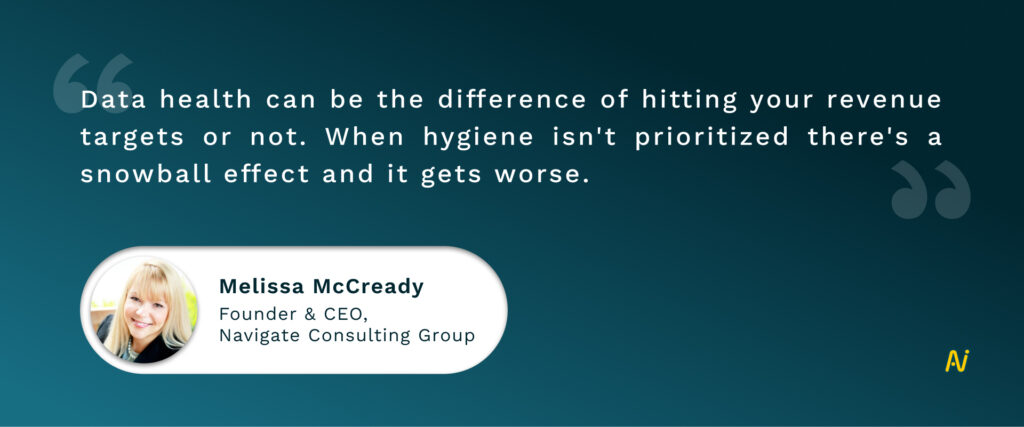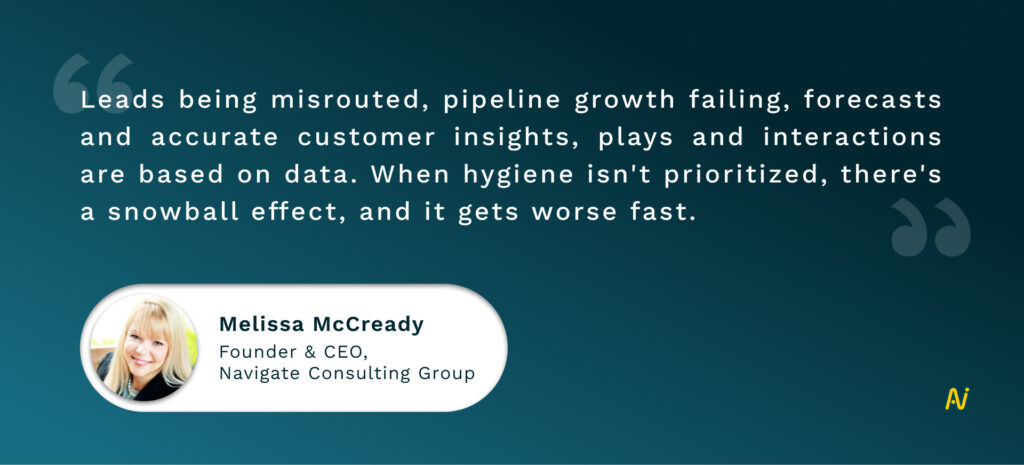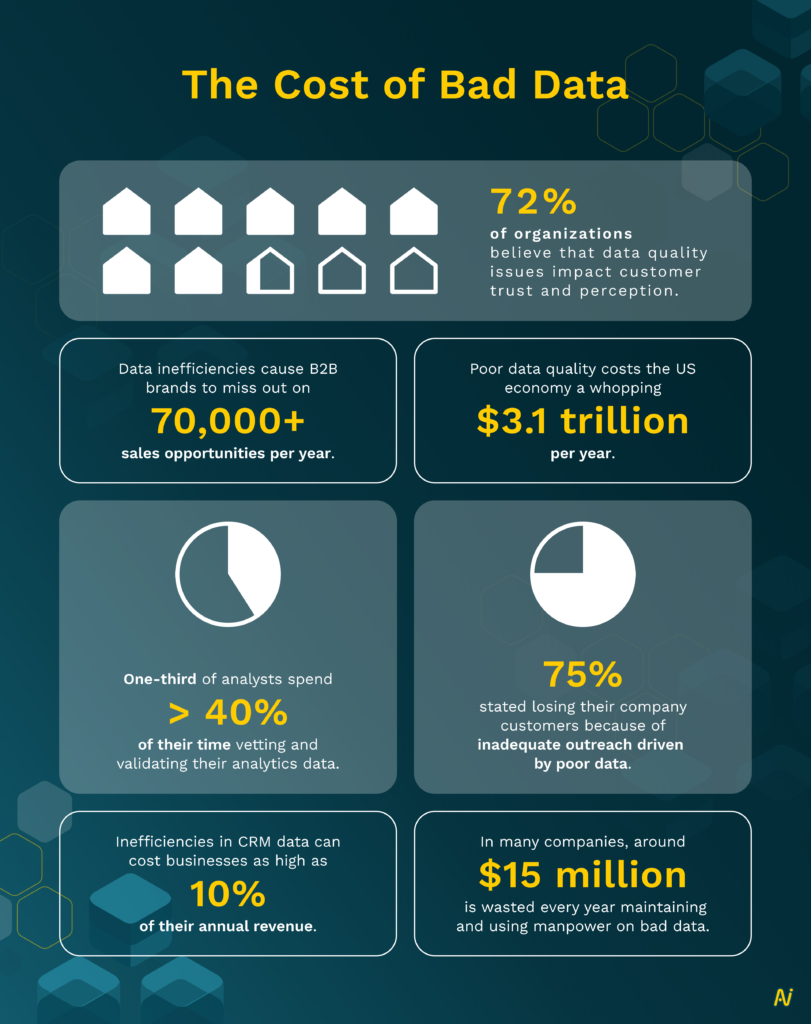Do you have a way to confirm if the data in your CRM is correct?
Or if it is reliable for gathering useful insights to improve the sales process?
Can it help generate better forecasts?
If you said no, you’re not alone.
70% of revenue leaders are not confident in the accuracy of their CRM data.
In a recent survey, 95% of respondents reported that data quality issues seriously impaired their ability to fully leverage their CRM system.
CRM data comes with its own inefficiencies. Siloed data trapped in different tech stacks, missing or incomplete data from CRM, manual data entry are some of these inefficiencies that cost organizations $36 billion in missed revenue!
With these errors, your CRM can quickly turn into an unreliable and expensive mess with missing contacts and activity data.
Addressing this data issue is critical to be able to succeed in sales in 2022 (and way beyond). And first party data enrichment is one solution that can help your team prospect better, deliver exceptional buyer experiences and push maximum deals to the closing line.
With first party data enrichment in your CRM, you can automatically track and update changes in contacts in real-time and make it your competitive differentiator.
What is CRM Data Enrichment?
CRM data enrichment is a process that enhances, refines and improves the data in your CRM that gets collected through marketing campaigns or sales efforts.
It strengthens the value of your data by making it richer. It strengthens the profile information of your current and potential customers of a business.
This enrichment can happen with the help of a sales intelligence tool that can be integrated with your CRM. This tool identifies missing information in your CRM and automatically updates and adds more value to it.
Let’s understand with an example. Your sales rep might have met with a prospect and manually updated the person’s email address and phone number into the CRM. This might be the person your sales rep thinks is the core decision maker in the buying committee.
What if an actual decision maker enters the conversation through an email? This person is just marked in the emails. He is not contributing to the discussion.
For all you know, this new stakeholder might have the maximum power in pushing the deal forward. Will your rep reach out to this key stakeholder? The truth is this person’s contact will never get captured into the CRM. Failure to update this contact information can result in a potentially lost deal.
CRM data enrichment takes care of all these inefficiencies that come with manual data entry. It automatically captures additional information that can be critical in pushing a deal towards closure.
At an organizational level, this can mean sales and marketing teams having access to a pool of correct and up-to-date data of prospects that they can potentially reach out to.
Why do you Need CRM Data Enrichment?
The volume of a business’s data grows as the business scales. And more and more of this business-critical data gets fragmented and scattered across various applications.
This makes critical data inconsistent, siloed and costly – and CRM data keeps getting messier with time. No one knows where to actually go to get correct and up-to-date information about customers.
These inefficiencies lead to wasted time, lost employee hours, erroneous decision making, and shifts focus on the wrong aspects of the business. Bad data makes organizations miss out on shifting the focus on areas that matter.
Here are some challenges that CRM data poses:
1. Missing data
Most CRM data is uploaded manually. Manual uploads steal precious selling time from sales reps. Not failing to mention the risk of incorrect uploads.
And 63% of reps refuse to use their CRM. This leaves out crucial data from the CRM that can put a dent on your revenue engine.
2. Stale data
CRM data gets stale at a ridiculously fast rate. B2B data decays at a rate of 70.3% per year.
Failure to update data regularly can have a major impact on your bottom line. Campaigns continue to build around stale data and the results bring in no ROI to the business.
3. Inaccurate data
Inaccurate data is incorrect or poorly maintained information. This can include wrong contact details like names, emails, job titles etc.
Having inaccurate data can harm your sales and marketing outreach efforts. Some examples include – Sending emails to the wrong person. Or sending the same message to the same person twice.
These errors can damage a company’s reputation.

The Cost of Bad CRM Data
How much is bad data actually costing you?
- Data inefficiencies cause B2B brands to miss out on 70,000+ sales opportunities per year.
- Poor data quality costs the US economy a whopping 3.1 trillion per year.
- 72% of organizations believe that data quality issues impact customer trust and perception.
- 1/3rd of analysts spend more than 40 percent of their time vetting and validating their analytics data before it can be used for strategic decision-making.
- 75% of respondents lose their company customers because of poor data driven inadequate outreach driven by poor data.
- Inefficiencies in CRM data can cost businesses as high as 10% of their annual revenue.
- In many companies, around $15 million of the budget is wasted every year maintaining and using manpower on bad data.

CRM data enrichment is a continuous process that silently works in the background and rids your data of all the errors. It is a necessary tool to help you capture the right data, eliminate manual dependencies on sales teams and append existing data by attaching more value to it in real time.
Data enrichment tools automatically pull the missing data points in your CRM from multiple internal and external sources and feed this intelligence into your CRM system. This automation eliminates dependence on manual data entry and CRM data up-to-date.
It pulls out data from your tech stack and updates it into your CRM. You can identify critical information like missing contacts in the buying committee, behavioural patterns of your prospects. All these aspects can help you predictably forecast your revenue for the quarter.

Use Cases of CRM Data Enrichment
1. Find and upload missing contacts into CRM
A lot of contacts do not get captured on CRM. These contacts can play a crucial role in driving deals forward.
CRM enrichment captures all missing contacts and automatically uploads it to your CRM. These missing contacts might have a strong buyer intent and can be of tremendous value to customer facing teams like marketing, sales and customer success.
2. Create personalized marketing campaigns
80% of consumers are more likely to make a purchase from a brand that provides personalized experiences. Enriched data is accurate and up-to-date. It reveals critical information that can help you understand the unique needs, desires and pain points of your customers.
72% of organizations believe that data quality issues impact customer trust and perception. Accurate and enriched data is the key to create targeted and personalized customer experiences. Using highly relevant enriched data to run targeted ABM campaigns will lead to higher conversions.
This approach improves trust and perception and will convince your buyers that you have their best interest in mind. This improves account sales and accelerates opportunities for revenue growth.
3. Reduce fields in lead capture forms
No lead wants to fill up long and complicated lead forms. Such an experience can negatively impact the conversion rate of your landing pages.
With data enrichment, B2B marketers can eliminate unnecessary fields on the form as most of it automatically gets captured in the CRM. This leaves lead forms with just a few fields for a lead to fill, and does not compromise on the quality of the lead.
By having data about the right leads, sales and marketing teams have the right intelligence to deploy strategies that can increase visitor-to-lead conversions.
4. Improve productivity among sales teams
Sales teams spend only 30% of their time on selling activities. The rest of the time goes into manual tasks like logging activities and manually inputting sales data into systems like CRM’s. This moves their focus from strategic activities that help them sell more, and direct their crucial time towards non-selling tasks.
CRM data enrichment eliminates a lot of manual dependency for sales teams. By capturing data automatically into the CRM, a data enrichment tool can free up to 5 to 6 hours of sellers’ time per week.
The result? Sales teams can focus on tasks that help them sell more. With reliable and correct information, there is no need to double check if the leads are correct.
5. Improve lead scoring
If your sales teams have a clear view of which leads have a higher chance of converting, they can align their efforts to the right tasks. The result is better conversions and higher win rates.
CRM enrichment helps you gather a holistic view of every lead, giving you thorough information about them. This can be data related to location, demographics, company data, behavioral patterns etc. The more data you have about your lead, the more accurate will your lead scoring and segmentation be.
Improved lead scoring will help you figure out which leads your teams must focus on and what conversion strategy you should follow depending on their stage in the funnel.
6. Deliver a uniform & superior customer experience
Real-time CRM data enrichment delivers correct and better data. This data is a reservoir of insights to be used by all your customer facing teams like sales, marketing and customer success. CRM data enrichment can create a single source of truth for your revenue team and use the insights to make better data-driven business decisions.
Based on the enriched CRM data, your customer success, sales and marketing teams can understand the needs of your prospects and customers better, and figure out how to create personalized experiences for them at various stages of the selling process.
Achieve Confidence in your CRM Data
The quality of your data will affect your sales forecast, which will affect your revenue. With updated and enriched data, you can get confidence in your data. And use insights from that data to drive revenue-generating strategies.
Make the quality of your data a priority to uncover powerful revenue opportunities. Nektar’s Unified Activity Capture Solution provides a frictionless way to improve CRM hygiene and helps extract value from your existing GTM tech stack.
With Nektar’s AI for RevOps, you can proactively find all the contacts your reps forgot to save, and add those missing contacts to the opportunities your sales team is actively working on.
Auto import missed contacts into your CRM and get:
- More time to close deals for your reps
- More reliable forecasting
- Less manual data entry for everyone
Get a true view of buyer coverage and pipeline progression with Nektar.







